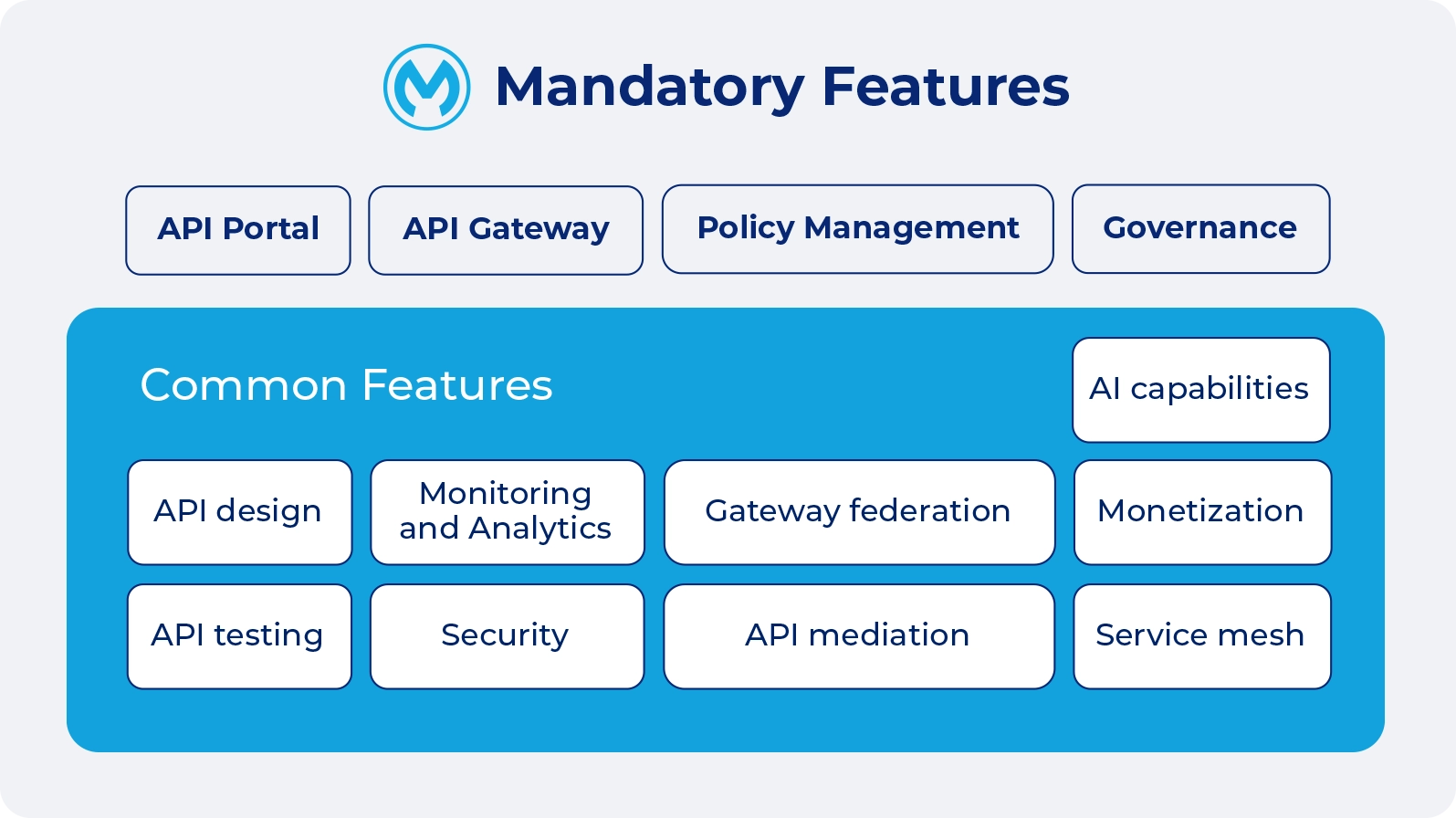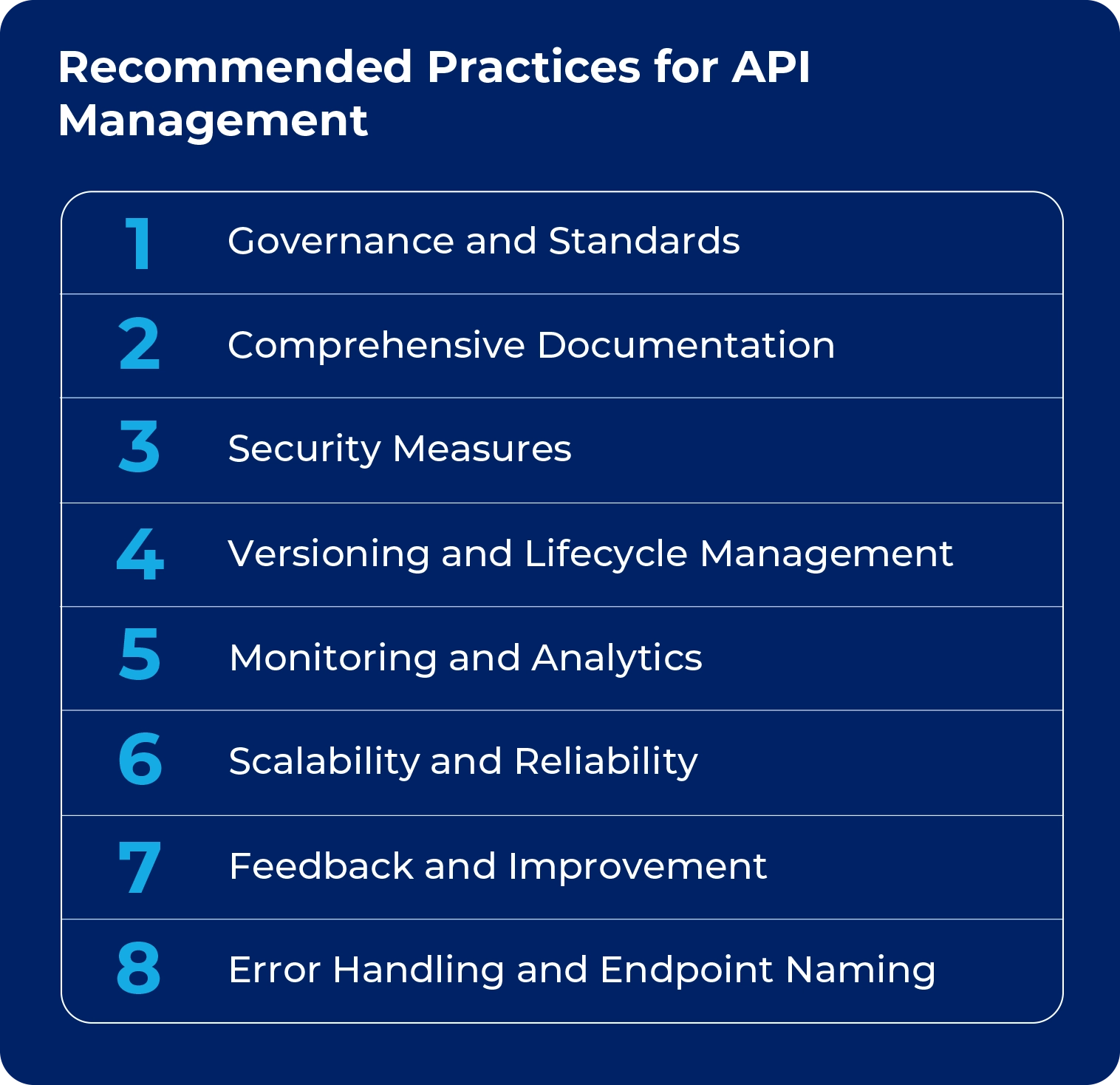APIs connect applications, facilitate integration, introduce innovative digital solutions, and make data and services more accessible and reusable.

As API usage increases, it becomes critical to manage, maintain, and monitor them while addressing potential governance issues to make application integration processes more secure and reliable. API management involves the creation, design, publishing, analysis, supervision, testing and securing of APIs within an environment.
Why is API Management Important?
While the API Management market is already massive, its growth is projected to accelerate further due to the steady progress of cloud adoption and data-driven decision-making. Therefore, APIs’ impact on business agility, scalability, and technological innovation is only becoming more tangible.
APIs are fundamental for modern digital solutions, including mobile applications, cloud services, and many more. Efficient API management enhances API security, reliability and business value. API management is also pivotal for safeguarding sensitive data, preventing unauthorized access, regulatory compliance, and boosting performance and user experience.
API Management solutions help companies with multiple challenges, including:
- Integration assets deployment
- API access control
- Vulnerabilities and security breaches
- Accelerated time to market
- At scale monitoring and finetuning of APIs
API Lifecycle Management
API management is critical throughout the API lifecycle – from the initial definition and design, through development, testing, and security, to the deployment and distribution stages. When creating an API contract in the design stage, we set API behavior rules and ensure the API is user-friendly. The development stage is dedicated to securing and deploying the APIs and building the monitoring and scaling infrastructure.
API management is also connected to monetization, developer engagement, marketing, managing APIs as products, and other business activities that might seem unrelated from a technical point of view but are significant, nonetheless.
API Management Tools
According to Gartner, there are several mandatory API management software features:
- API Portal for discovery
- API Gateway for runtime management and security
- Policy Management for enforcing rules
- Governance for versioning and access control.
There are also a few common features, including API design, API testing, Monitoring and Analytics, Security, Gateway federation, API mediation, Monetization, Service mesh and AI capabilities that improve both functionality and user experience.

API Gateway
The API gateway is essential to API management and provides a single entry point for accessing backend services. It deals with routing, security, and protocol conversions to deliver structured and secure communication between clients and APIs.
The gateway’s security measures like encryption and authentication safeguard the APIs and prevent vulnerabilities. It also manages critical tasks including usage, monitoring, traffic control, rate limiting, and performance optimization. This facilitates interactions with backend services and API consuming.
Developer Portal
The portal connects API providers and consumers to ensure seamless API access, discovery, and management. This self-service central hub enables developers to find interactive API documentation, credentials, and tools.
API portals streamline communication, accelerate onboarding, engage developers, and facilitate API browsing, building, testing, and integration. They provide valuable insights, including developer-facing analytics, app approval status, and monetization details. Furthermore, API portals support the entire API lifecycle and inform users when an API is retired.
Governance
API Governance involves enforcing rules and best practices that ensure standardization, compliance and security to make APIs both protected and user-friendly. API version management, access control, publication, and operations are also part of the governance process. These standards include OWASP, HIPAA, GDPR, etc.
Analytics and Monitoring
High-quality API management is impossible with analytics and monitoring tools and platforms to track and analyze API performance, usage metrics, and patterns. Such solutions provide real-time monitoring and response times, error rates, and latency measuring across proxies and targets. A comprehensive view of the overall performance and individual APIs, platforms, or entire ecosystems vastly improves the decision-making process as developers, product managers, and business stakeholders can base decisions on numerical evidence.
API experts utilize analytics dashboards to visualize metrics, including API calls, response times, uptime, adoption trends, and geographic usage. They also leverage integrated analytics programs for automated reporting and long-term analysis. Diagnosing and troubleshooting solutions enhance operational efficiency and business impact, resulting in optimized API performance and maximized ROI.
Testing
API management’s testing capabilities enhance API reliability and security by deploying techniques like mock testing, functional testing, performance testing, and security testing.
Policy Management
The API Policy Manager configures pre-built or custom security policies to tailor API execution and improve adaptability. This is pivotal for API mediation, usage limits, throttling, quota management, and security setup. Policies can enforce rules without changing how the code is implemented and provide an additional layer of logic for data manipulation or route validation.
Security and Compliance
API management security and compliance are absolutely critical to guarantee API protection against breaches and meeting regulatory standards. API security measures include consistent authentication, authorization, abuse prevention, and access control rules. Sensitive data protection implies that only authorized users and systems can access and edit it, while security solutions detect security risks, enforce policies, and ensure regulatory compliance.
Best Practices for API Management (APIM)

There are quite a few strategies and methods that boost API development, implementation, and maintenance. Despite APIM requirement variations across companies, the following practices are practically inevitable.
- Establish and clarify governance policies and standards to boost API quality, reliability, and security and maintain regulatory compliance.
- Provide comprehensive API documentation through a developer portal, including detailed instructions and practical use cases to make it more user-friendly.
- Implement security measures like Auth Tokens, OAuth 2.0, JWT, and encryption to prevent unauthorized access and enforce strict identity rules.
- Use proven versioning strategies to maintain backward compatibility and facilitate API updates while making sure developers are aware of all changes.
- Monitoring performance metrics, usage patterns, and uptime will help you identify areas for improvement, boost scalability, and derive actionable insight for data-driven decisions.
Utilize techniques like load balancing and failover mechanisms to make APIs scalable, reliable, highly available, and capable of handling new demands.
- Developers’ feedback is critical for finetuning APIs and developer portals while enhancing adoption and usability.
- Intuitive endpoint naming and descriptive error handling will help you provide clear feedback and improve user experience.
Industry Use Cases of API Management
Efficient API management is crucial for scalability and innovation in multiple use cases across industries.
- In Healthcare, APIM enhances interoperability via patient management, electronic health records (EHR), personalized patient care plans, real-time monitoring of patient conditions, reminders via secured and regulatory compliant APIs, etc.
- In FinTech, APIM enables real-time data access for seamless integrations with BFSI systems for direct transactions, account updates, and market data retrieval. Its authentication, encryption, and access control mechanisms guarantee multilayer security, as well as sensitive financial and personal information protection. It leverages the capabilities of analytics and monitoring solutions to identify anomalies like fraud or untypical activities. Furthermore, API management helps unlock legacy applications so that the FinTech sector can modernize systems and drive innovation.
- In retail, API management is beneficial for personalizing customer experiences. Integrated customer data across platforms allows businesses to tailor recommendations and offers in accordance with behavior trends. Inventory management and distribution also benefit from APIM, as it allows real-time stock updates and automated workflows that streamline operations.
Business Benefits of Effective API Management
Selecting the most suitable API management tools among the multiple available options is critical as it will most probably impact your company’s API strategy significantly. On-premise, cloud, or hybrid architecture support, vendor relationships, market position, and alignment with your company business needs are among the key factors you need to consider. Gartner and Forrester reports can also help you identify reliable vendors and their strengths.
However, despite fierce competition, it is MuleSoft that stands out as the ultimate API management solution. It boasts advanced API design, governance, and deployment capabilities and supports hybrid and multi-cloud environments that distinguish it from rival technologies. Businesses that need scalable and robust API management solution will duly appreciate its high ratings in analyst reports and impressive track record across industries.
MuleSoft’s Universal API Management solution includes advanced tools for managing, securing, and monitoring APIs such as Mule Gateway, Flex Gateway, and Anypoint Service Mesh’s runtime features.

MuleSoft’s seamless Composable Architecture includes the API-led connectivity approach that utilizes tools for pro-code and low-code integration, like Composer and RPA integrations, to facilitate unprecedented API building and connection efficiency. Its universal visibility catalogs APIs, documentation, and specifications to deliver a single source of truth. It also promotes reusable assets and secure practices to ensure governance at scale and helps developers and stakeholders collaborate, leverage automation, and create engaging digital experiences.
Conclusion
API management is fundamental for driving innovation in the realm of modern technology. As companies continue their digitalization journey, APIM solutions are becoming increasingly valuable for seamless collaboration and communication, streamlined operations, and maintaining their competitive edge. The API market is dynamic, but the businesses that leverage API management’s full capabilities will be better positioned to stay ahead of the curve.



